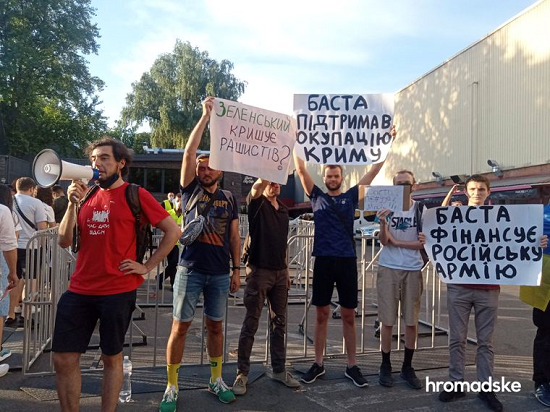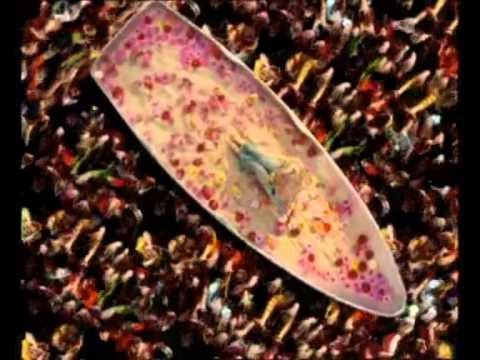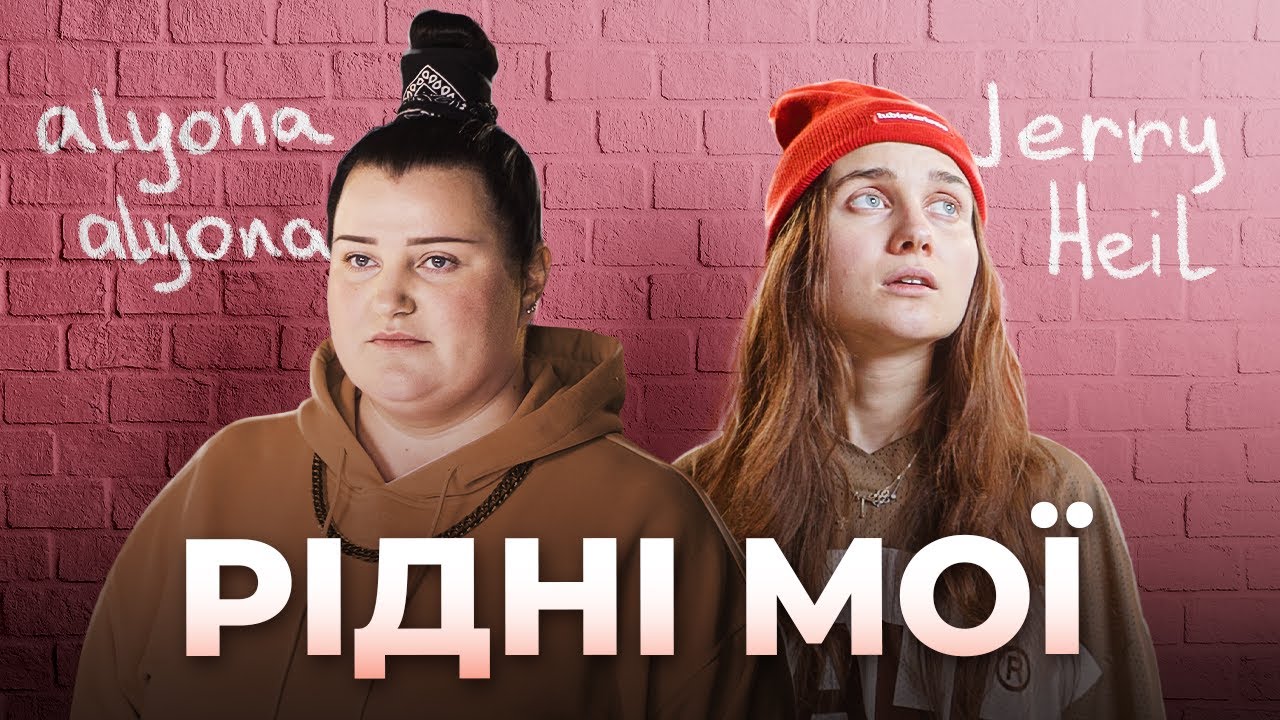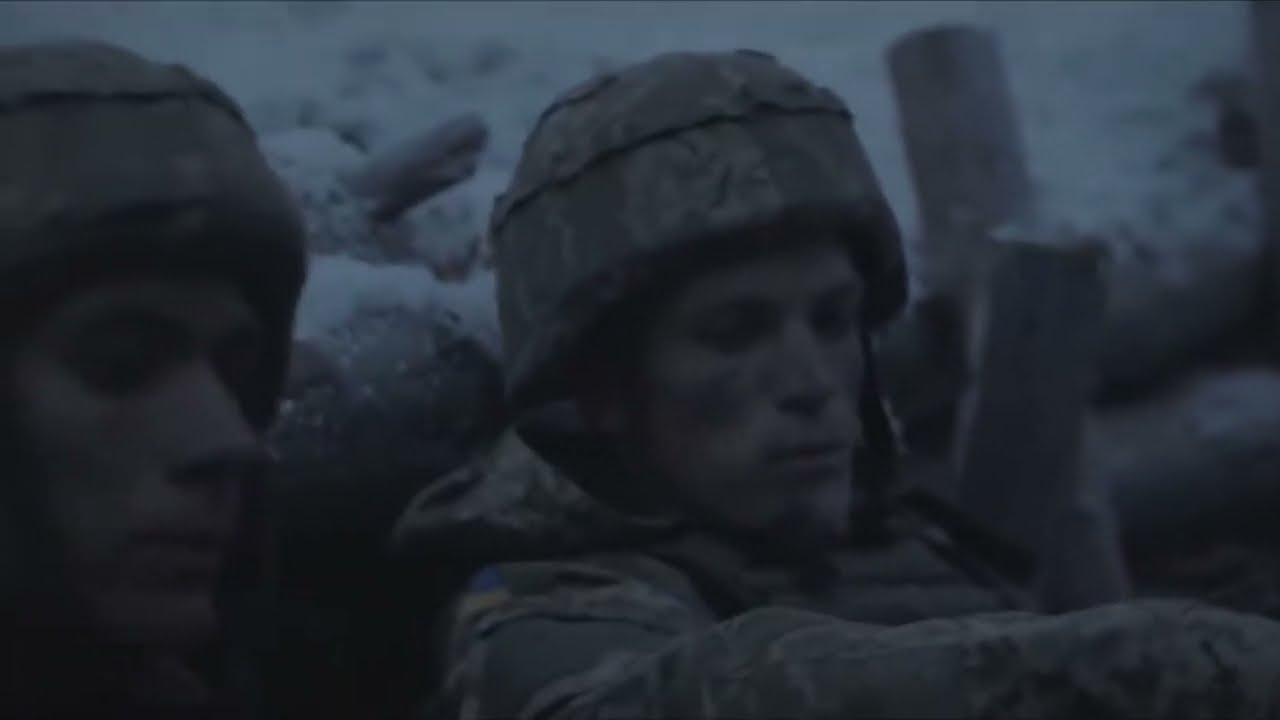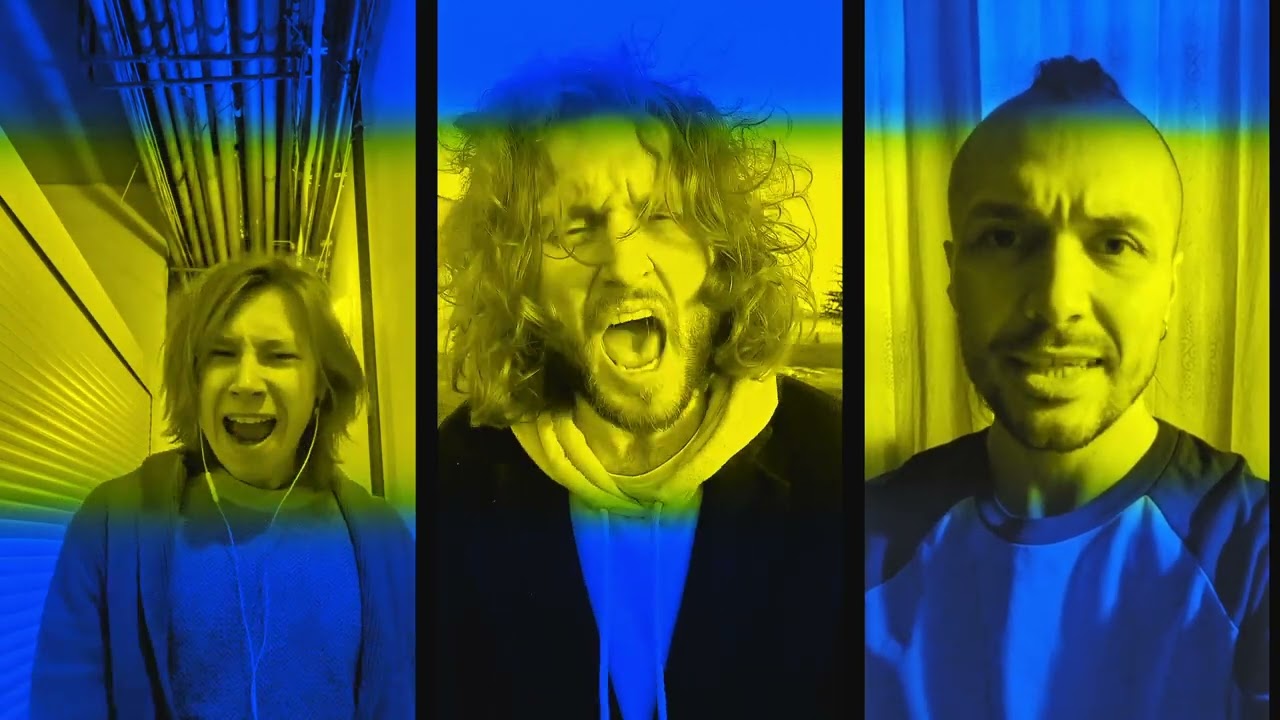Protests over russian artists playing in Ukraine, before the 2022 invasion
“When my aunt gave her passport to the Russian he asked, "Why are your hands shaking?"
An anonymous Ukrainian from Novotroitske, a town occupied by russian troops
My name is Yaryna. I am the 30-year-old editor-in-chief of the biggest Ukrainian alternative music website, Neformat. You all know that Ukraine is at war with russia*.
Every day I persuade myself that my job is a form of moral support for my fellow people from the underground scene. I have spent the last months compiling a wide picture of modern Ukrainian war music, which you can access via the playlist just below.
The Old Man Is Back Again
I don’t want to sound like some dull school teacher, but if you want to understand Ukraine and especially the current war which russia started, you must know some of our history. Whether we are talking the Russian Empire or Soviet Union, russia has tried to destroy my language, culture and my people for the last 300 years. At best they forbade books in Ukrainian language but during their worst moments they have organised famine and built concentration camps.
I personally have relatives that escaped Holodomor and died in the Gulag. We Ukrainians were never a full-fledged nation in russian eyes, only “malorosy” (small russians). If you’d like to know more, further information is in this article.
The newly-born russian federation has also tried to influence our country via culture, corrupt politics, media, propaganda and many other non-warfare means. Alex Bondarenko, who has written about Ukrainian music for this site, described these processes recently. Ukraine was a newly-born postcolonial country that constantly paid attention to what was happening in russia. Back then, a lot of russian money poured into the Ukrainian entertainment industry, on the understanding the music created was in the “understandable” russian language. The underground never saw any money, but a postcolonial inertia was felt powerfully there as well.
A classic example of this entertainment genre is a singer widely known as the Ukrainian Madonna back in the 1990s, who started working for russian-orientated market.
The biggest cultural influence is still language. Even though I was born in the the furthest part of Ukraine from the russian border, have a Ukrainian-speaking family and a wider environment that is mostly Ukrainian-speaking, I still know russian well. I’m not able to forget it, no matter how I’d like to. All because of books, music, films and even Ukrainian television and radio.
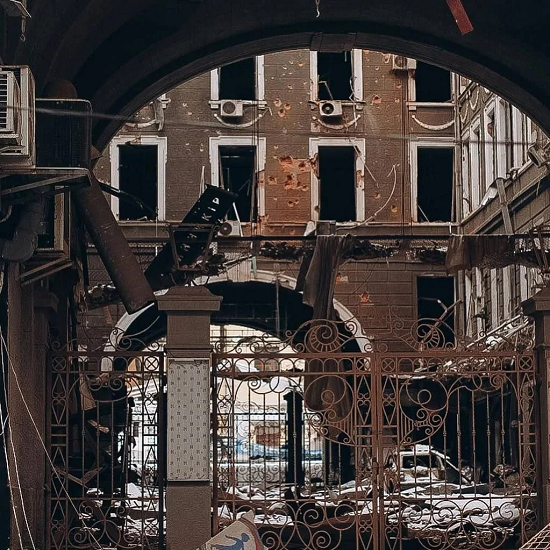
Kharkiv
Recently I was shocked to see the young daughter of my cousin filming her TikToks in russian. This trend is summed up by a great quote from Ostap Ukrainets, a Ukrainian writer and author of historical fiction that explores imperialism in Ukraine’s past: "You don’t need to die for being Ukrainian if you pretend you’re a Russian. Even if you don’t believe it at first. Fake it ’til you make it, till this mimicry becomes part of your skin. Have you ever wondered why so many Ukrainians speak Russian? This is why."
Prophets Of Big War
I don’t feel like Ukraine discussed the risks of being a postcolonial country until 2013. But after the Revolution Of Dignity and recent russian aggression, most Ukrainians are rethinking the roles of the Ukrainian and russian languages and how this affects culture and politics in our own personal lives. Now I see many old tracks being reposted with prophetic warnings, or texts such as pop singer Jerry Heil’s recent press release: “This is a track about the war, written before the war. A few months before Russia’s attack on Ukraine, I began to long for the everyday life we did not appreciate. As if I knew.” At first I thought these claims were exaggerated, but now I can clearly see a pattern of loss and regret, and a reshaping of songs’ messages. Rapper Alyona Alyona, has said that her song ‘Рідні мої’ (My Dear) revolves around Easter family traditions: “This year has dramatically changed us, changed everything around us. Many families will no longer reunite […] and many ovens will no longer bake Easter cakes. But we will carry the traditions of our nation and our families. So that their memory will be eternal.”
Many recently shared Sasha Chemerov’s song ‘Прокинься’ (Get Up). The artist has since written: “I am hurt and ashamed that I did not feel the prophecies that came to me almost two years ago. If I had known back then what I was writing about, my actions would have been different.” For me the best example of such a repurposed song is SKLADNO’s ‘На твоєму боці’ (On Your Side). Originally it was about “all the good fathers of troubled daughters” and inspired by the new Arcane series. But the text somehow resonates so well with this war that the author herself made a new war version of this song. And it’s beautiful; one of the best songs I’ve heard over the past few months.
There is still no Ukrainian law forbidding listening to russian music, performing in russia or promoting concerts for russian bands. And obviously no laws forbidding people from speaking russian in their everyday life let alone singing in it. But many Ukrainians feel that doing these things has became inappropriate. Kyrylo Brener, guitarist in Kharkiv-based post-hardcore band КАТ talked about searching for his Ukrainian identity whilst “anticipating” the catastrophe on the band’s new album Поклик (The Call): “I think this album is about the search for your identity. We are from a Russian-speaking city, but the Ukrainian language isn’t something foreign to us. I was interested in exploring my own connection with our language, to see if KAT sounded natural in Ukrainian. We tried to draw a line between the past and the present.”
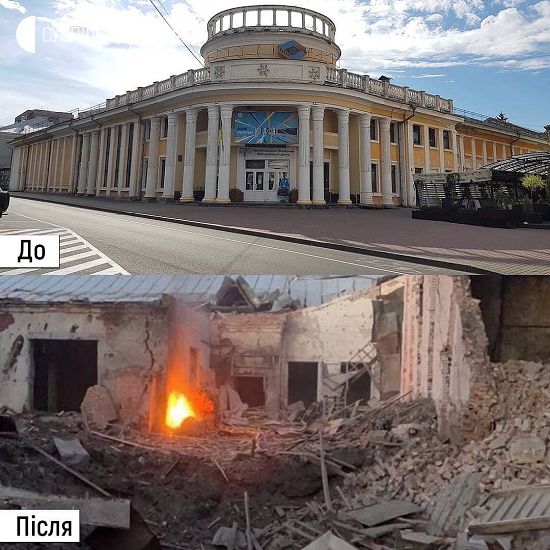
A cinema and gig venue in Chernihiv, before and after the russian invasion
The band recorded their first album in Ukrainian between September and November 2021 at Ukraine’s Spivaki record studio. Now, members of the band either left to fight to protect Kharkiv or fled to safer Ukrainian towns. The studio possibly still exists, but the owners had to flee through the nearby forests from the russian troops surrounding it. Kyrylo Brener says, “After this war began, I perceive these songs another way. Some of them even appeared to be prophetical. And now I can say for sure the language choice wasn’t a coincidence”.
Now, even more bands have started singing in Ukrainian or claim their intentions to do so. Great examples can be found on the Odesa hardcore scene. The people who represent it have created dozens of high-quality projects and russian-language releases over the years, but ВІДСІЧ with their fresh Пліч-О-Пліч (Shoulder to Shoulder) EP must be their first project in the Ukrainian language.
A Live Circuit Without russia
Cultural connections are loosening (many towns are now removing soviet monuments to Pushkin, for example). In terms of music I can point to Ukrainian underground bands who have mostly stopped performing in russia. Many of those who played after 2014 now deeply regret it. Oleksa Bleedyi, frontman of Kharkiv’s now defunct sludge band SOOM: “It took me a long time to realise that russians are enemies, because I tried to stay away from politics. I’m still sorry that SOOM went to moscow after 2014, although I still reassure myself that we were ‘asked’. We played underground gigs, where the public was the countercultural opposition, they sang the texts of our track about the Heavenly Hundred [those killed during Euromaidan] and apologised for the Crimea and more. But in 2018, after my last visit to moscow, I came out of the fog. I saw I had nothing in common with these people."
Mykola Maha, a vocalist in Skruta, The Symbioz and Обрій, has been active in the underground scene since the 2000s. He confirms that until 2017-2018, some underground Ukrainian bands still played in russia but this number was constantly declining and later almost fully stopped. However, russians still performed in Ukraine. “The situation varied over different scenes. For instance, what we call the ‘russian new wave’ with bands like Ploho, Shortparis or Буерак, often had concerts in not only Kyiv, but also Lviv, Odesa or Kharkiv. With the hardcore punk scene, I would say that the quantity of concerts by russian artists declined slowly but steadily after the Revolution of Dignity. Then they almost disappeared outside of random visits, like that from Kytowrath. But big russian rock and metal bands like Wildways, Louna, Noise MC or Порнофильмы performed here until 2021.”
But even now, if a Ukrainian label wanted to release some grindcore band from russia they could, even if it would look strange to many of us. Everyone has a moral choice to make and a right to conduct their own business. But I’m pretty sure that a label doing this would mean many Ukrainian bands rejecting working with them. The same thing can be said about promoters if they try to bring russian artists back to Ukrainian stages. This serious discussion awaits us and it will be a tough one.
Pro- Or Anti-russians
Not all Ukrainians want change overnight. Even now, when a bomb can literally fall on your head, some try to protect elements of russian culture here. Opinions are divided and fall into three broad categories. One group still can’t believe that a country is capable of such horrors (though it’s not “just putin” dropping all the bombs on our cities, raping our women and children and stealing from our houses). They try to look for the best in russians and pick out those rare representatives who dare condemn the war. The other group states we should drop all our connections with russia at once. These people are not radical nationalists but liberal women from the cultural sector, like Dasha Stokoz or Alona Dmukhovska. A third group supports cancelling all russians now, because it is not the right time to find out who is who, but I’d like to return to this question in a second. I personally support the second group the most, but public questions concerning this topic are happening right now and are ongoing. For instance, it was recently proposed a law that forbids all russian music in all public spaces in Ukraine, except for the artists that openly condemn the war russia started. Neformat wrote about it and it started a very interesting discussion about the risks of having such exceptions. Who gets to slip through the net?
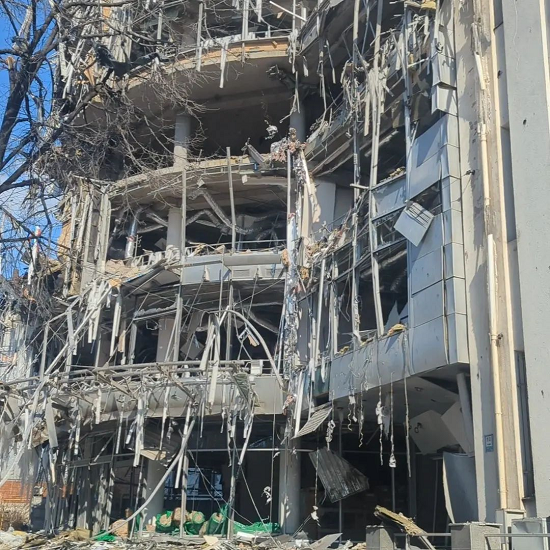
Office centre in Kharkiv
In this context we should definitely mention metal band Jinjer. They are probably the best known Ukrainian metal band in the world and once an object of pride for Ukrainian music lovers. But then they announced concerts in russia in 2020 and many people were pissed off. To make matters worse, the vocalist Tatiana Shmayluk praised some aspects of soviet history in an interview, and then bassist Eugene Abdukhanov backed this stance. And then some questionable posts from 2014 resurfaced. Now the band claims to have raised over €130,000 to help Ukraine. They are active as hell and no one questions what they do now. But can we forget their past just like that? The same goes for Sinoptik, who announced concerts in russia just a month before the start of the war. Things quickly changed from the joy of being in moscow for the first time to cancelling the show and promising to return after Ukraine wins, to finally claiming that they love Ukraine and that they will never perform in russia. Now the band makes patriotic videos and gathers donations for the Ukrainian people, but still it is hard to understand them being so insensitive just before the war started.
As you can see, these complex feelings towards Ukrainians performing in russia or listening to russian bands are not new. Like many others I used to listen to moscow punk band Bicycles For Afghanistan. Many Ukrainian punks knew band leader Алик Южный (Alik Yuzhny). But over time I wasn’t able to unsee the russian influence behind the music. It felt like sharing my enjoyment was also unacceptable. After the war started some people claimed that Alik moved to Georgia and wrote to them to explain how he feels about the situation. But what does that matter right now, when people are being killed or deported to russia? I don’t know what a russian has to do to look good in the eyes of Ukrainians right now. But you know what, I don’t give a shit about that. Like many others here I stopped hoping for changes from russians themselves, so let them deal with their problems on their own.
I’m pretty sure that we need to break all connections with russia. For me, we should remove all (I mean it – all – with no exceptions) russian cultural product from our country for at least 50 years, till our own culture is free of any postcolonial influence. Because it was this “soft power” that held us mentally, and we often didn’t even think about what it did to us. But now we do. And this is what all those musical prophecies actually meant – we had an inner cultural war, where we were getting rid of that postcolonial burden. Then russia felt it too and found no better way than trying to hold us back with weapons and power. But it is only now that we can stop and analyse this phenomenon and actually understand how far we have moved in the past eight years. The price has become very high, as all the prophets saw in their worst scenarios, but Ukraine will not stop now on its way to full freedom.

